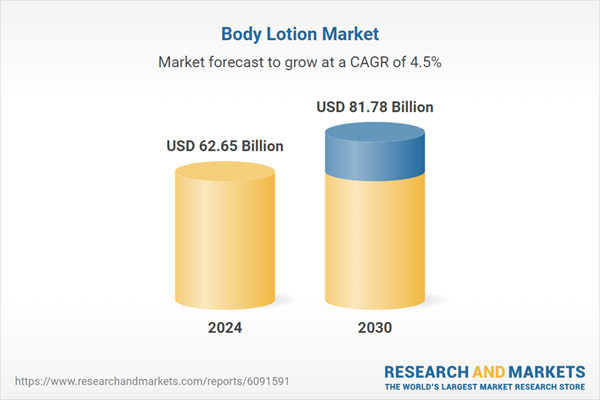Speak directly to the analyst to clarify any post sales queries you may have.
10% Free customizationThis report comes with 10% free customization, enabling you to add data that meets your specific business needs.
Key Market Drivers
Growing Consumer Awareness Toward Skin Health and Self-Care
A major factor propelling the global body lotion market is the heightened consumer focus on skin wellness and preventative care. With environmental stressors such as pollution and UV exposure becoming more prominent, consumers are increasingly recognizing the necessity of routine moisturization. This awareness, supported by expert advice from dermatologists and social media advocates, has transformed body lotions from luxury items into essential daily care products. The growing appeal spans various demographics, including men and older age groups, who are now incorporating skincare into their routines. Consumers are also more informed about specific skin concerns such as eczema, dryness, and sensitivity, prompting demand for lotions offering targeted benefits like anti-aging, sun protection, and deep hydration. The broader trend of preventive skincare further fuels this demand, as consumers aim to avert long-term skin issues through regular use of quality body care products.Key Market Challenges
Intense Market Competition and Brand Saturation
The global body lotion market is characterized by high competition due to the presence of numerous players across various scales. Multinational corporations such as Unilever, L'Oréal, and Johnson & Johnson hold considerable market share, backed by established distribution systems and brand loyalty. Simultaneously, a growing number of niche and emerging brands are entering the space with specialized offerings like vegan, fragrance-free, or natural lotions.This saturation results in a fragmented market where product differentiation becomes increasingly difficult, and price competition intensifies. Continuous innovation and aggressive marketing are essential just to maintain consumer engagement. Smaller companies, in particular, face obstacles related to R&D capabilities and advertising budgets, making it challenging to compete effectively. As a result, staying profitable while standing out in a saturated landscape presents an ongoing challenge.
Key Market Trends
Rising Demand for Functional and Specialized Body Lotions
The demand for multifunctional body lotions is rising as consumers seek products that provide more than basic hydration. There is a growing preference for body care solutions that incorporate ingredients commonly found in facial skincare, such as hyaluronic acid, retinol, and ceramides. These products cater to needs like anti-aging, firming, brightening, and sun protection. The shift is also influenced by the minimalism trend in skincare, where consumers favor fewer but more effective products. This has led to the expansion of high-performance body lotions across both premium and mass-market segments. Brands are responding with advanced, dermatologically tested formulations that appeal to health-conscious and results-oriented consumers, highlighting the evolution of body lotion from a basic moisturizer to a comprehensive skincare solution.Key Market Players
- Loreal SA
- Procter & Gamble
- Unilever Plc
- Johnson & Johnson
- Beiersdorf AG
- Estee Lauder
- Shiseido Company
- Galderma
- Henkel AG
- Kao Corporation
Report Scope:
In this report, the Global Body Lotion Market has been segmented into the following categories, in addition to the industry trends which have also been detailed below:Body Lotion Market, By Product Type:
- Bottle
- Tube
- Pumps
- Others
Body Lotion Market, By Distribution Channel:
- Supermarkets/Hypermarkets
- Departmental Stores
- Online
- Others
Body Lotion Market, By Region:
- North America
- United States
- Canada
- Mexico
- Europe
- France
- United Kingdom
- Italy
- Germany
- Spain
- Asia-Pacific
- China
- Japan
- India
- South Korea
- Vietnam
- South America
- Argentina
- Colombia
- Brazil
- Middle East & Africa
- South Africa
- Saudi Arabia
- UAE
- Turkey
Competitive Landscape
Company Profiles: Detailed analysis of the major companies present in the Global Body Lotion Market.Available Customizations:
With the given market data, the publisher offers customizations according to a company's specific needs. The following customization options are available for the report.Company Information
- Detailed analysis and profiling of additional market players (up to five).
This product will be delivered within 1-3 business days.
Table of Contents
Companies Mentioned
- Loreal SA
- Procter & Gamble
- Unilever Plc
- Johnson & Johnson
- Beiersdorf AG
- Estee Lauder
- Shiseido Company
- Galderma
- Henkel AG
- Kao Corporation
Table Information
| Report Attribute | Details |
|---|---|
| No. of Pages | 184 |
| Published | May 2025 |
| Forecast Period | 2024 - 2030 |
| Estimated Market Value ( USD | $ 62.65 Billion |
| Forecasted Market Value ( USD | $ 81.78 Billion |
| Compound Annual Growth Rate | 4.5% |
| Regions Covered | Global |
| No. of Companies Mentioned | 10 |









